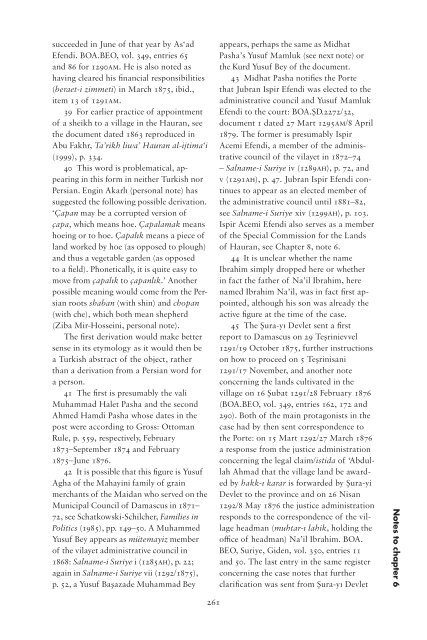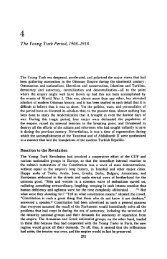Governing property, making the modern state - PSI424
Governing property, making the modern state - PSI424
Governing property, making the modern state - PSI424
Create successful ePaper yourself
Turn your PDF publications into a flip-book with our unique Google optimized e-Paper software.
succeeded in June of that year by As‘ad<br />
Efendi. BOA.BEO, vol. 349, entries 65<br />
and 86 for 1290AM. He is also noted as<br />
having cleared his financial responsibilities<br />
(beraet-i zimmeti) in March 1875, ibid.,<br />
item 13 of 1291AM.<br />
39 For earlier practice of appointment<br />
of a sheikh to a village in <strong>the</strong> Hauran, see<br />
<strong>the</strong> document dated 1863 reproduced in<br />
Abu Fakhr, Ta’rikh liwa’ Hauran al-ijtima‘i<br />
(1999), p. 334.<br />
40 This word is problematical, appearing<br />
in this form in nei<strong>the</strong>r Turkish nor<br />
Persian. Engin Akarlı (personal note) has<br />
suggested <strong>the</strong> following possible derivation.<br />
‘Çapan may be a corrupted version of<br />
çapa, which means hoe. Çapalamak means<br />
hoeing or to hoe. Çapalık means a piece of<br />
land worked by hoe (as opposed to plough)<br />
and thus a vegetable garden (as opposed<br />
to a field). Phonetically, it is quite easy to<br />
move from çapalık to çapanlık.’ Ano<strong>the</strong>r<br />
possible meaning would come from <strong>the</strong> Persian<br />
roots shaban (with shin) and chopan<br />
(with che), which both mean shepherd<br />
(Ziba Mir-Hosseini, personal note).<br />
The first derivation would make better<br />
sense in its etymology as it would <strong>the</strong>n be<br />
a Turkish abstract of <strong>the</strong> object, ra<strong>the</strong>r<br />
than a derivation from a Persian word for<br />
a person.<br />
41 The first is presumably <strong>the</strong> vali<br />
Muhammad Halet Pasha and <strong>the</strong> second<br />
Ahmed Hamdi Pasha whose dates in <strong>the</strong><br />
post were according to Gross: Ottoman<br />
Rule, p. 559, respectively, February<br />
1873–September 1874 and February<br />
1875–June 1876.<br />
42 It is possible that this figure is Yusuf<br />
Agha of <strong>the</strong> Mahayini family of grain<br />
merchants of <strong>the</strong> Maidan who served on <strong>the</strong><br />
Municipal Council of Damascus in 1871–<br />
72, see Schatkowski-Schilcher, Families in<br />
Politics (1985), pp. 149–50. A Muhammed<br />
Yusuf Bey appears as mütemayiz member<br />
of <strong>the</strong> vilayet administrative council in<br />
1868: Salname-i Suriye i (1285AH), p. 22;<br />
again in Salname-i Suriye vii (1292/1875),<br />
p. 52, a Yusuf Başazade Muhammad Bey<br />
261<br />
appears, perhaps <strong>the</strong> same as Midhat<br />
Pasha’s Yusuf Mamluk (see next note) or<br />
<strong>the</strong> Kurd Yusuf Bey of <strong>the</strong> document.<br />
43 Midhat Pasha notifies <strong>the</strong> Porte<br />
that Jubran Ispir Efendi was elected to <strong>the</strong><br />
administrative council and Yusuf Mamluk<br />
Efendi to <strong>the</strong> court: BOA.ŞD.2272/32,<br />
document 1 dated 27 Mart 1295AM/8 April<br />
1879. The former is presumably Ispir<br />
Acemi Efendi, a member of <strong>the</strong> administrative<br />
council of <strong>the</strong> vilayet in 1872–74<br />
– Salname-i Suriye iv (1289AH), p. 72, and<br />
v (1291AH), p. 47. Jubran Ispir Efendi continues<br />
to appear as an elected member of<br />
<strong>the</strong> administrative council until 1881–82,<br />
see Salname-i Suriye xiv (1299AH), p. 103.<br />
Ispir Acemi Efendi also serves as a member<br />
of <strong>the</strong> Special Commission for <strong>the</strong> Lands<br />
of Hauran, see Chapter 8, note 6.<br />
44 It is unclear whe<strong>the</strong>r <strong>the</strong> name<br />
Ibrahim simply dropped here or whe<strong>the</strong>r<br />
in fact <strong>the</strong> fa<strong>the</strong>r of Na’il Ibrahim, here<br />
named Ibrahim Na’il, was in fact first appointed,<br />
although his son was already <strong>the</strong><br />
active figure at <strong>the</strong> time of <strong>the</strong> case.<br />
45 The Şura-yı Devlet sent a first<br />
report to Damascus on 29 Teşrinievvel<br />
1291/19 October 1875, fur<strong>the</strong>r instructions<br />
on how to proceed on 5 Teşrinisani<br />
1291/17 November, and ano<strong>the</strong>r note<br />
concerning <strong>the</strong> lands cultivated in <strong>the</strong><br />
village on 16 Şubat 1291/28 February 1876<br />
(BOA.BEO, vol. 349, entries 162, 172 and<br />
290). Both of <strong>the</strong> main protagonists in <strong>the</strong><br />
case had by <strong>the</strong>n sent correspondence to<br />
<strong>the</strong> Porte: on 15 Mart 1292/27 March 1876<br />
a response from <strong>the</strong> justice administration<br />
concerning <strong>the</strong> legal claim/istida of ‘Abdullah<br />
Ahmad that <strong>the</strong> village land be awarded<br />
by hakk-ı karar is forwarded by Şura-yi<br />
Devlet to <strong>the</strong> province and on 26 Nisan<br />
1292/8 May 1876 <strong>the</strong> justice administration<br />
responds to <strong>the</strong> correspondence of <strong>the</strong> village<br />
headman (muhtar-ı lahik, holding <strong>the</strong><br />
office of headman) Na’il Ibrahim. BOA.<br />
BEO, Suriye, Giden, vol. 350, entries 11<br />
and 50. The last entry in <strong>the</strong> same register<br />
concerning <strong>the</strong> case notes that fur<strong>the</strong>r<br />
clarification was sent from Şura-yı Devlet<br />
Notes to chapter 6












